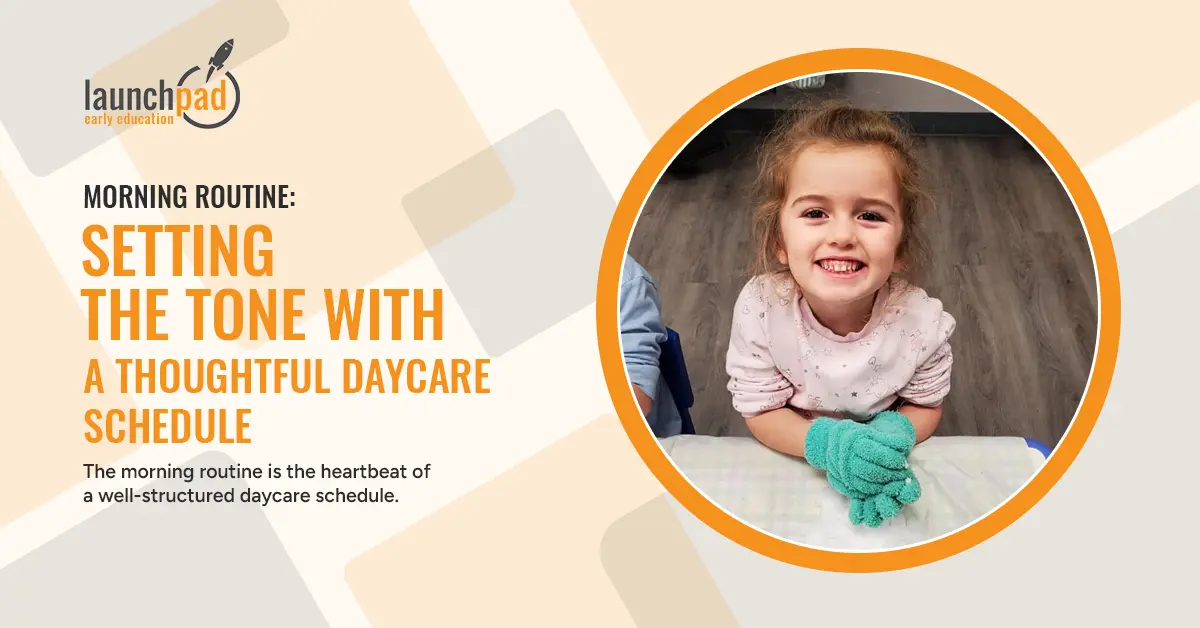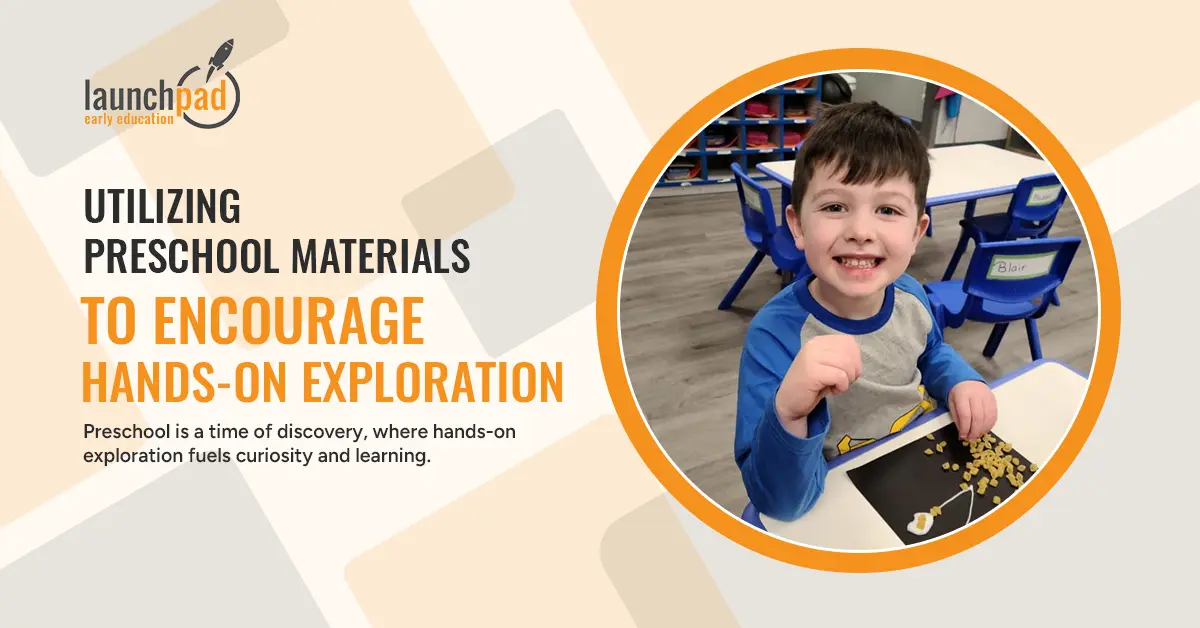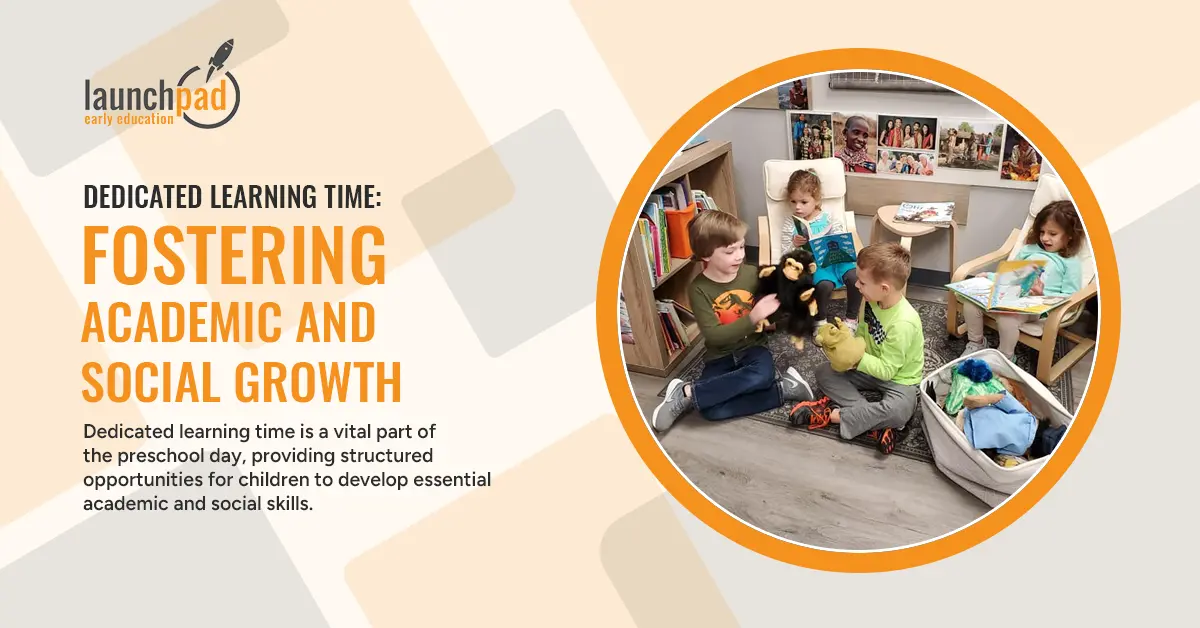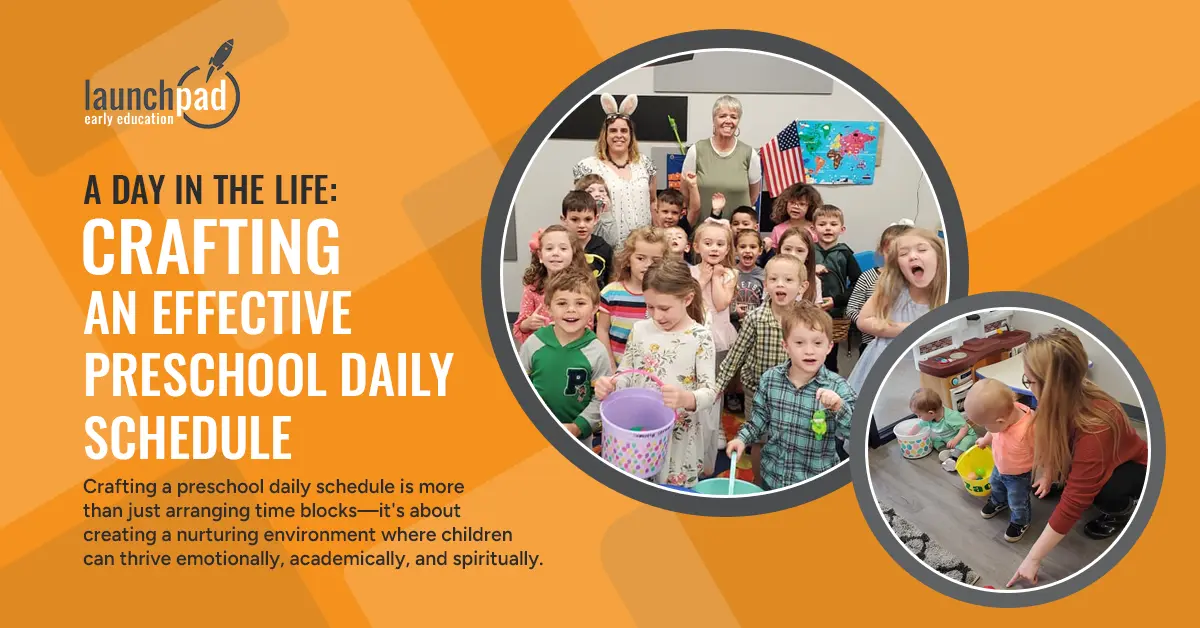Crafting a preschool daily schedule is more than just arranging time blocks—it’s about creating a nurturing environment where children can thrive emotionally, academically, and spiritually. At LaunchPad Early Education, we believe that a well-structured day offers the perfect balance of learning, play, and rest, fostering growth in every child. Every moment is designed with care and intention, from engaging circle times to hands-on activities inspired by our faith-based curriculum.
A thoughtfully planned schedule helps children feel secure and confident and empowers teachers to nurture each child’s unique needs. Join us as we explore how to create an effective preschool daily schedule that reflects your values, enriches learning, and supports holistic development.
Morning Routine: Setting the Tone with a Thoughtful Daycare Schedule
 The morning routine is the heartbeat of a well-structured daycare schedule. It establishes the foundation for the rest of the day, creating a comforting and consistent environment where children feel secure and excited to learn. With the right approach, mornings can transform into joyful, purposeful beginnings.
The morning routine is the heartbeat of a well-structured daycare schedule. It establishes the foundation for the rest of the day, creating a comforting and consistent environment where children feel secure and excited to learn. With the right approach, mornings can transform into joyful, purposeful beginnings.
Warm Welcome: Building a Foundation of Trust
A positive start begins with making every child feel seen and valued. This initial connection helps ease any drop-off anxiety and sets a welcoming tone for the day.
- Personalized Greetings: Acknowledge each child with their name and a smile as they arrive.
- Comfortable Drop-Off: Create a designated area where parents can say goodbye and children can settle in.
- Soothing Atmosphere: Use calming music or cheerful decorations to create an inviting space.
These small gestures go a long way in helping children transition smoothly from home to the classroom, ensuring they feel secure and ready to engage.
Check-In Activities: Engaging Children from the Start
After arrival, it’s essential to ease children into their day with light, engaging activities. This phase allows children to acclimate while gradually fostering independence and creativity.
- Exploratory Play: Offer sensory bins, blocks, or puzzles that encourage hands-on interaction.
- Activity Stations: Set up table activities like coloring, matching games, or simple crafts.
- Classroom Jobs: Assign roles like feeding a classroom pet or organizing toys to boost responsibility.
Providing a mix of independent and group activities ensures that every child has something they enjoy, helping them feel comfortable and focused as the day begins.
Circle Time: Creating Connection and Structure
Circle time is integral to a daycare schedule. It promotes a sense of community and sets the tone for the day’s learning. This structured group activity fosters communication and builds anticipation for what’s ahead.
- Interactive Songs: Begin with songs that involve clapping or movement to energize the group.
- Daily Themes: Introduce a topic, like colors, shapes, or letters, to provide a focus for the day.
- Sharing Opportunities: Allow children to talk about their mornings or favorite things to practice social skills.
This shared experience helps children feel connected to their peers and prepares them mentally for the activities planned for the rest of the day.
Transitioning to the Next Activity: Easing Into the Day
Smooth transitions are critical to maintaining a calm and organized environment. Children can adjust more easily to the changing structure by clearly signaling what comes next.
- Visual Cues: Use cards or posters to represent the day’s schedule visually.
- Transition Songs: Incorporate short, fun songs to signal the end of one activity and the start of another.
- Positive Reinforcement: Offer encouragement and praise to children who transition smoothly.
With clear guidance and consistent cues, transitions can become seamless, helping children move confidently into the next part of their day.
Utilizing Preschool Materials to Encourage Hands-On Exploration
 Preschool is a time of discovery, where hands-on exploration fuels curiosity and learning. The right preschool materials can transform a classroom into a world of endless possibilities, helping children develop motor skills, creativity, and problem-solving abilities. Educators can create a dynamic learning setting by providing thoughtfully selected tools and resources.
Preschool is a time of discovery, where hands-on exploration fuels curiosity and learning. The right preschool materials can transform a classroom into a world of endless possibilities, helping children develop motor skills, creativity, and problem-solving abilities. Educators can create a dynamic learning setting by providing thoughtfully selected tools and resources.
Creative Centers: Inspiring Imagination and Discovery
Creative centers are a cornerstone of hands-on exploration, offering children opportunities to express themselves while building important cognitive skills.
- Art Supplies: Include crayons, markers, paint, and paper for open-ended artistic creation.
- Building Blocks: Offer a variety of blocks, such as wooden, foam, or magnetic, to encourage spatial reasoning and collaboration.
- Dress-Up Items: Provide costumes and props for imaginative role-playing and storytelling.
These materials allow children to experiment, problem-solve, and bring their ideas to life, fostering individual expression and group collaboration.
Sensory Play: Enhancing Motor Skills and Cognitive Development
Sensory materials are invaluable in preschool settings, as they engage multiple senses and promote hands-on learning through exploration.
- Sand and Water Tables: Encourage tactile experiences and teach basic scientific concepts like volume and weight.
- Sensory Bins: Fill bins with rice, beans, or beads, and hide small objects for children to find and identify.
- Playdough and Clay: Help strengthen fine motor skills while inspiring creativity through molding and sculpting.
These activities provide endless fun and help children refine their motor skills, develop focus, and explore textures and shapes.
Rotating Materials: Keeping Learning Fresh and Exciting
Regularly introducing new preschool materials keeps the classroom environment dynamic and stimulates children’s curiosity.
- Weekly Themes: Rotate materials based on themes, such as animals, transportation, or seasons, to align with learning goals.
- Interactive Tools: Introduce puzzles, matching games, or STEM-focused toys to build problem-solving and logical thinking.
- Cultural Items: Include materials representing diverse cultures, such as traditional instruments or art pieces, to encourage inclusivity and broaden perspectives.
By keeping materials fresh and aligned with the curriculum, educators can maintain a sense of excitement and inspire continued exploration.
Outdoor Materials: Extending Learning Beyond the Classroom
Outdoor exploration provides unique opportunities for physical activity and nature-based learning, making it a vital part of hands-on preschool education.
- Gardening Tools: Supply child-sized shovels, gloves, and seeds for planting activities.
- Nature Kits: Include magnifying glasses, bug catchers, and notebooks for outdoor observations.
- Sports Equipment: Offer balls, hoops, and jump ropes to encourage active play and teamwork.
These materials connect children with nature while supporting physical development and environmental awareness.
Dedicated Learning Time: Fostering Academic and Social Growth
 Dedicated learning time is a vital part of the preschool day, providing structured opportunities for children to develop essential academic and social skills. By balancing individual and group activities, educators can create an environment that increases curiosity, collaboration, and confidence. This period allows children to build foundational knowledge while cultivating critical interpersonal abilities.
Dedicated learning time is a vital part of the preschool day, providing structured opportunities for children to develop essential academic and social skills. By balancing individual and group activities, educators can create an environment that increases curiosity, collaboration, and confidence. This period allows children to build foundational knowledge while cultivating critical interpersonal abilities.
Small Group Sessions: Personalized Attention for Academic Growth
Small group sessions are ideal for teaching targeted skills, allowing educators to address each child’s needs. These focused activities help children grasp new concepts in a supportive setting.
- Literacy Activities: Introduce letter recognition games, storytime, or phonics exercises to develop early reading skills.
- Math Exploration: Build mathematical foundations using counting games, number puzzles, and shape identification tasks.
- Science Projects: Engage children in simple experiments, such as exploring plants’ growth or observing weather changes.
These sessions strengthen academic skills and provide teachers opportunities to nurture each child’s confidence and interest in learning.
Interactive Group Activities: Building Teamwork and Social Skills
Group activities during learning time promote collaboration, communication, and problem-solving. Children learn to share ideas, listen to others, and work together to achieve common goals.
- Collaborative Art Projects: Encourage children to create murals or crafts as a team, fostering creativity and cooperation.
- Group Games: Organize activities like scavenger hunts or building challenges to develop teamwork and critical thinking.
- Role-Playing Scenarios: Use props and costumes to simulate real-world situations, helping children practice empathy and social interactions.
These activities teach children to work harmoniously with peers while developing a sense of community and belonging.
Individual Learning Opportunities: Encouraging Independence and Self-Confidence
Incorporating moments for self-directed learning helps children build independence and a sense of ownership over their education. This approach allows them to explore personal interests at their own pace.
- Learning Stations: Set up areas focused on specific skills, such as writing, puzzles, or technology-based activities.
- Choice Boards: Provide a menu of activities for children to choose from, empowering them to make decisions.
- Progress Recognition: This is a way to boost self-esteem and celebrate milestones, such as completing a puzzle or mastering a new skill.
These individualized moments help children become more self-reliant and motivated, laying the groundwork for lifelong learning habits.
Faith-Based Lessons: Nurturing Values Alongside Education
Incorporating faith-based teachings during learning time supports spiritual growth and character development. Lessons aligned with your preschool’s values can instill moral principles while reinforcing academic topics.
- Bible Stories: Share age-appropriate stories that align with themes like kindness, honesty, and perseverance.
- Scripture Memorization: Use simple verses to teach values and enhance memory skills.
- Practical Applications: Discuss real-life scenarios where children can apply moral lessons, such as sharing or helping others.
Faith-based learning enriches children’s understanding of the world while helping them grow emotionally and spiritually.
Conclusion
Crafting an effective preschool daily schedule is the key to unlocking a world of growth, joy, and discovery for young learners. From a nurturing morning routine to engaging in hands-on activities and dedicated learning time, every part of the day plays a crucial role in shaping children’s academic, social, and emotional development. By combining structure with creativity and faith-centered values, preschools can create an environment where children thrive, build lasting friendships, and create a lifelong love of learning.
Are you ready to give your child a preschool experience that inspires confidence, curiosity, and character? Contact LaunchPad Early Education today at (615) 809 2211 or visit our website to learn more about our programs. Let’s build a brighter future together!


